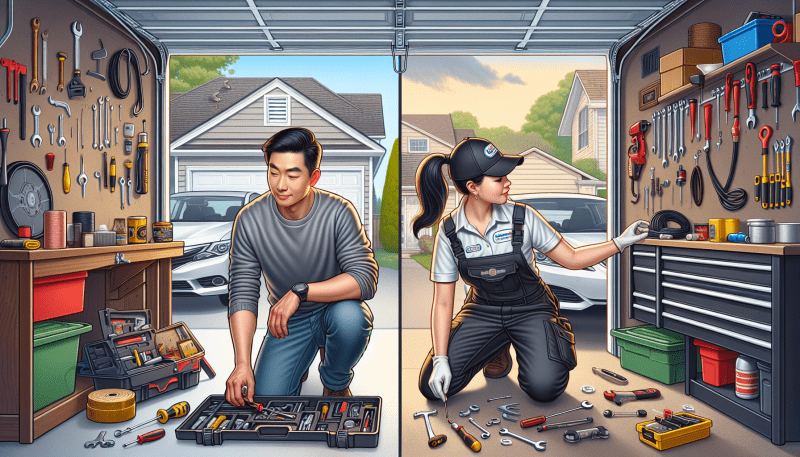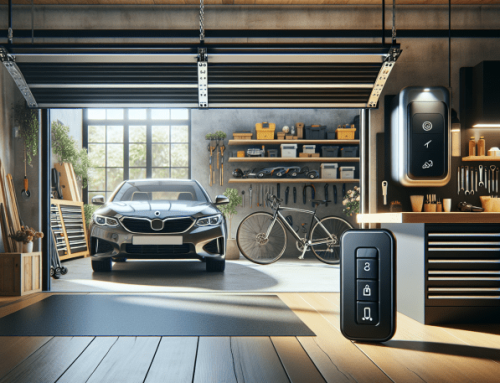**Garage Door Repair: DIY vs. Professional Help**
When your garage door malfunctions, do you reach for your toolbox or call in the experts? Many homeowners face this dilemma, weighing the benefits of DIY repairs against the reliability of professional assistance. Understanding the nuances of garage door repair can save you time, money, and potential frustration.
In this article, we’ll explore the pros and cons of tackling garage door issues yourself versus hiring a professional service like Garage Door Pros, known for their swift and affordable solutions in South Florida. While DIY repairs can be cost-effective, they often come with risks, especially if you lack experience. On the other hand, professional help ensures safety and expertise, providing peace of mind.
So, what’s the best approach for your garage door repair needs? With insights from industry experts, we’ll guide you through the decision-making process. Let’s dive deeper into the world of garage door repairs and discover the right solution for you!
Understanding Garage Door Mechanisms
A garage door system consists of several key components that work together seamlessly. The door itself is the most visible part, typically made of steel, wood, or fiberglass. It moves along tracks, which guide its motion and ensure stability. Springs play a crucial role by counterbalancing the door’s weight, making it easier to open and close. There are two types of springs: torsion and extension, each serving a specific function.
The opener is another vital component. It uses a motor to automate the door’s movement, allowing for convenient access. Safety features, such as photoelectric sensors, prevent the door from closing on objects or people, enhancing overall safety.
Understanding how these components interact is essential for effective maintenance. For instance, if the springs are worn, the door may not operate smoothly. Regular inspections can help identify issues early. For more detailed information on maintenance, visit our FAQ section. If you need professional assistance, check out our service offerings. Understanding these mechanisms can empower homeowners to make informed decisions about repairs and upgrades.
Common Garage Door Problems
Homeowners often face various garage door issues that can disrupt daily routines. Misalignment is a common problem. It occurs when the door does not open or close smoothly. You might notice gaps or uneven spacing along the edges. Broken springs are another frequent issue. If your door feels heavy or won’t budge, the springs may need replacement. Malfunctioning openers can also cause frustration. If the remote fails to respond or the door stops midway, it’s time to investigate.
Noisy operation is often overlooked but can indicate underlying problems. Loud grinding or squeaking noises suggest that the rollers or hinges may require lubrication or replacement. To assess the severity of these issues, observe the door’s behavior. If it operates erratically or shows signs of physical damage, seek help immediately. For minor issues, consider DIY solutions, but for complex problems, professional assistance is advisable. For more information on repairs, visit our service page or check our FAQ section for guidance.
DIY Garage Door Repair: Pros and Cons
When considering DIY garage door repair, several advantages come to mind. First, you can save a significant amount of money. Repairing your garage door yourself eliminates labor costs. Additionally, the convenience of working on your schedule is appealing. You can tackle the project when it suits you best. Many DIY enthusiasts also find satisfaction in completing a task independently. For instance, one homeowner successfully fixed a malfunctioning opener and felt a great sense of accomplishment.
However, DIY repairs come with notable risks. Injuries can occur if proper safety precautions are not followed. Moreover, without professional expertise, you might inadvertently cause further damage. This could lead to more costly repairs down the line. A DIYer once attempted to replace springs but ended up damaging the door mechanism. This situation highlights the importance of knowing your limits.
Ultimately, weigh the pros and cons carefully. If you decide to proceed, ensure you have the right tools and knowledge. For more information on professional assistance, visit our services page or check out our FAQ for guidance.
When to Call a Professional
When dealing with garage door issues, knowing when to seek professional help is crucial. Complex repairs, such as malfunctioning openers or broken springs, often require expert intervention. If you notice unusual noises or your door fails to open or close properly, don’t hesitate to call a professional. Safety concerns also warrant immediate attention. Garage doors are heavy and can cause serious injuries if mishandled.
Hiring a professional offers several benefits. Experts bring specialized knowledge and experience, ensuring repairs are done correctly. Additionally, many services provide warranties on their work, giving you peace of mind. Furthermore, professionals can save you valuable time, allowing you to focus on other important tasks.
To help you decide, consider this checklist:
- Is the repair beyond your skill level?
- Are there safety risks involved?
- Do you lack the necessary tools?
- Is the issue affecting your daily routine?
If you answer “yes” to any of these questions, it’s time to reach out to a garage door repair service. For more information, visit our about page or contact us directly.
Tools and Materials Needed for DIY Repairs
When tackling garage door repairs, having the right tools and materials is essential. Start with basic hand tools like wrenches and screwdrivers. These will help you adjust or replace various components. Additionally, consider investing in a set of pliers for gripping and twisting tasks. For more complex repairs, you may need replacement springs, which are crucial for the door’s operation. Lubricants, such as silicone spray or lithium grease, ensure smooth movement and reduce wear.
You can find these tools at local hardware stores or online retailers like Amazon. Many stores offer kits that include multiple tools, saving you time and money. Always check for customer reviews to ensure quality.
Safety should be your top priority. Wear safety goggles to protect your eyes from debris. Gloves are also recommended to prevent cuts and scrapes. If you’re unsure about any repair, consult a professional. For more information on services, visit our service page. If you have questions, check our FAQ section for guidance.
Step-by-Step Guide to Common DIY Repairs
When tackling common garage door repairs, follow these steps for effective results.
- Replacing a Broken Spring:
- Safety First: Wear safety goggles and gloves.
- Disconnect the opener and secure the door.
- Use a winding bar to unwind the tension from the broken spring.
- Remove the old spring and install the new one, ensuring it’s properly aligned.
- Rewind the spring carefully and reconnect the opener.
- Realigning Tracks:
- Preparation: Ensure the door is closed and unplug the opener.
- Inspect the tracks for bends or debris.
- Use a level to check alignment.
- Loosen the track mounting bolts and gently tap the track into position.
- Tighten the bolts and test the door’s movement.
- Fixing a Malfunctioning Opener:
- Caution: Disconnect power before starting.
- Check the remote batteries and replace if necessary.
- Inspect the wiring for any loose connections.
- Test the safety sensors; clean them if they’re dirty.
- Reconnect power and test the opener.
Always prioritize safety during repairs. For more detailed information, visit our FAQ section or learn about our services. If you need assistance, don’t hesitate to contact us.
Maintenance Tips for Garage Doors
Regular maintenance is essential for prolonging the life of your garage door and preventing costly repairs. A well-maintained garage door operates smoothly and enhances your home’s security. Start with a simple checklist to keep your door in top shape. First, lubricate all moving parts, including hinges and rollers, to reduce friction. Next, inspect the cables, springs, and tracks for any signs of wear or damage. Cleaning the door’s surface helps prevent rust and maintains its appearance.
Consider establishing a maintenance schedule. Perform basic tasks monthly, such as lubrication and visual inspections. Every quarter, conduct a more thorough check, including tightening hardware and testing the auto-reverse feature. This proactive approach minimizes the risk of unexpected issues and ensures your garage door functions efficiently.
For more detailed information on garage door services, visit our service page. If you have questions, our FAQ section provides valuable insights. Remember, consistent maintenance is key to a reliable garage door.
Cost Comparison: DIY vs. Professional Repair
When considering garage door repairs, the cost can vary significantly between DIY efforts and hiring a professional. DIY repairs often seem cheaper at first glance. However, you must factor in the costs of parts and tools. For instance, a replacement spring may cost around $50, while specialized tools can add another $30 to $100. Additionally, if you encounter hidden issues, such as damaged tracks or wiring, expenses can escalate quickly.
On the other hand, professional services typically charge between $100 and $300 for common repairs. This price often includes labor, which can save you time and hassle. For example, a professional might resolve a broken spring issue efficiently, minimizing the risk of recurring problems.
In the long run, investing in professional help may prove more cost-effective. While DIY repairs can save money upfront, they often lead to repeated issues if not done correctly. Therefore, consider the potential for future repairs and the time you’ll spend on the project. Ultimately, weighing these factors can guide you in making the best choice for your garage door needs. For more information on repair options, visit our services page or check our FAQ section.
Frequently Asked Questions (FAQs)
When it comes to garage door repair, many homeowners have questions. Understanding the signs that your garage door needs repair is crucial. Look for unusual noises, slow operation, or misalignment. These can indicate underlying issues.
You might wonder if you can tackle repairs yourself. While some minor fixes are manageable, complex problems often require professional expertise. Hiring a professional can ensure safety and proper handling of the repair.
Cost is another common concern. Typically, hiring a professional for garage door repair ranges from $150 to $500, depending on the issue. For a detailed breakdown, check our cost guide.
Safety is paramount during repairs. Always disconnect the power and use safety gear. Additionally, regular maintenance is essential. Aim to inspect your garage door every six months. This proactive approach can prevent costly repairs down the line. For more tips, visit our FAQ section.
Conclusion: Making the Right Choice
In conclusion, understanding when to tackle garage door issues yourself and when to call in professionals is crucial. Assess your skills honestly. If the problem seems minor, a DIY approach might suffice. However, for complex issues, seeking expert help ensures safety and efficiency. Remember, garage doors are heavy and intricate systems. Missteps can lead to injuries or further damage.
Evaluate the severity of your situation before making a decision. If you’re unsure, consider reaching out to professionals who can provide guidance. For more information on services available, visit our service page.
We encourage you to share your experiences or ask questions in the comments section below. Your insights can help others facing similar challenges. Additionally, if you’re interested in learning more about garage door types, check out our types of garage doors page. Making the right choice can save you time, money, and frustration.






